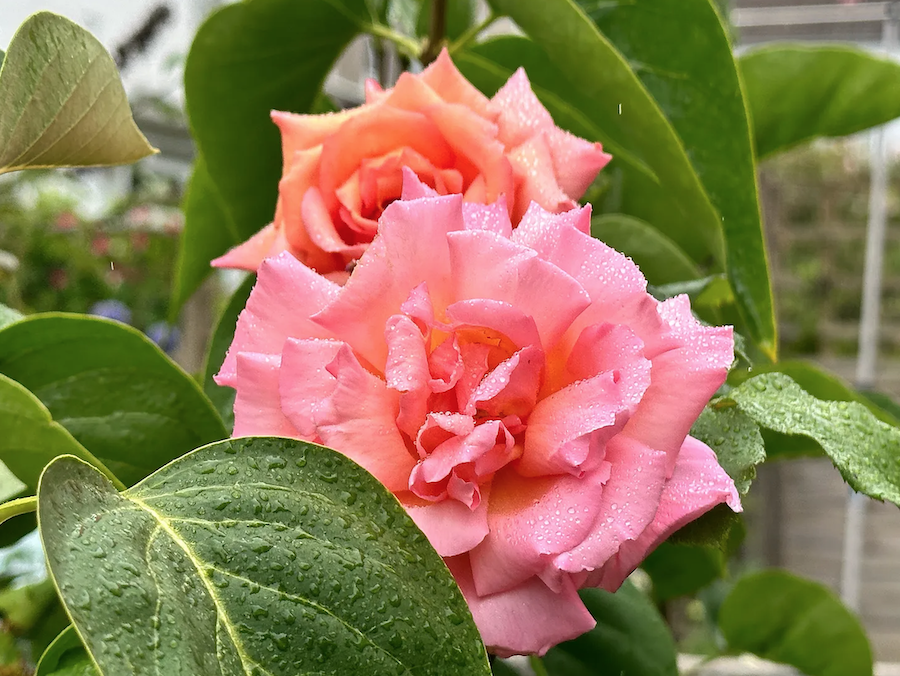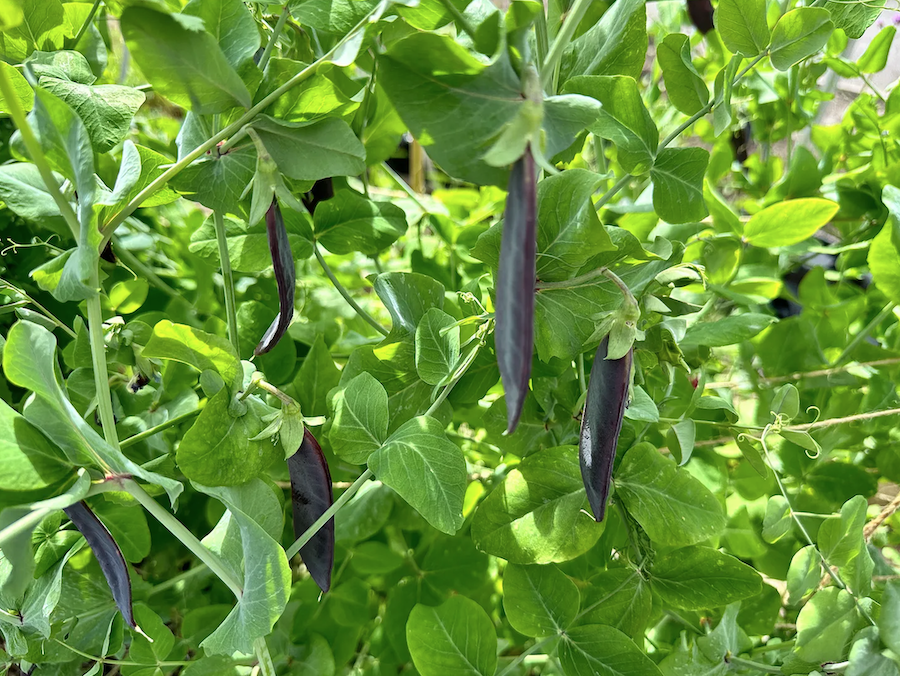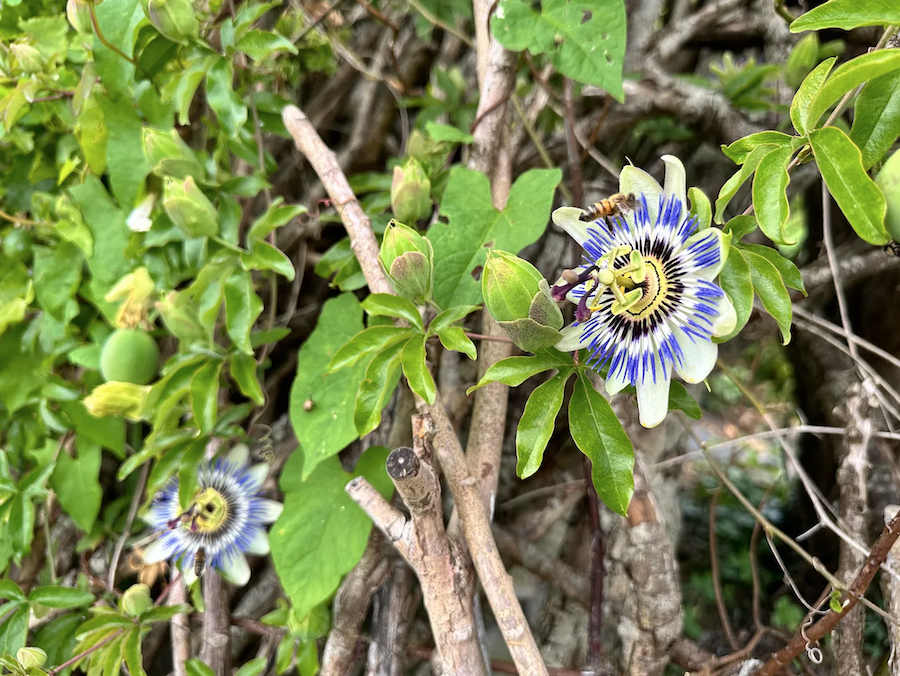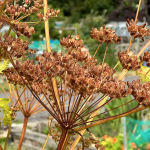On responding instead of reacting
Good morning! Autumn arrives early this year in the UK, in my felt, embodied sense, about two weeks early—what usually happens in mid-August unfolded in the last week. Parsnip seeds are ready to pick, berries are super-sweet, and rowan trees shine with splashes of red (the rowan berries on my office estate have already been consumed by busy birds). Any day now, I will be collecting conkers!
Roses both in our garden and on the allotment plot are in their second round of full bloom – which is stunning! They love the heat and the sun, so with a little bit of evening watering, they stand tall and bright, really cheering me up. The plot is still busy with insects, now enjoying pollinating the passion fruit flowers and peas. As I wrote earlier, we are only growing peas and potatoes this year due to the slug invasion, so it’s good to see that the flowers can keep all those little beasties busy and fed.

I am reading a book about disconnected and connected societies and individuals – it feels ever so well-timed! I am also thinking about serendipity, movement, and alignment on this in my life right now. My last week was very good – the best week for my wellbeing this year with a lot of significant work done (work aligned with our values makes us happy), validation and connection (with close friends, locations and community). Our last week, as a country, was horrific, unveiling and hopeful. The events of last week shook the country and rippled out with strong, emotional reactions into the carrying professions, too. So, we should be – in a healthy state of connection; we should be able to feel what is happening around us safely and steadily.
As with any other healthy emotional response, I had to steady myself in order to respond and not react and add to the divisive fire flaring up around us.
On the one hand, my close and online community members expressed the need for guidance—as a liberation practitioner, experienced activist, and millennial Eastern European who lived through Communism at the Polish-Ukrainian border, suddenly, my social positioning shifted into an expert on appropriate reaction. I connected with the little me, who at the age of 10 stood in the front of the “Arbeit Macht Frei” gates and who remembers every brick of that camp museum situated only 200 kilometres from my home…
This week, I was asked and grappled with the same questions myself: Should I go to protest? How else can I help the migrants and refugees? How can I make a difference? What is helpful? What is the bigger picture here?

The key is always to go steady and safely—connected with our core values, ourselves, and others. Action is only helpful if we are 100% sure that how we show up will benefit the common good and won’t escalate violence, crime, and overall divides. Action also comes with many layers. Some of us – like myself at the moment – are healers. Some of us are in a good social position to go out to the counter-protest and protect the vulnerable, take a loud stand, and make a banner. Others may be reporting and providing a wide range of perspectives to ensure that all voices are heard. Social media professionals will be needed to help stop the spread of misinformation or to support the reporting of crimes. All those actions are important, and one person cannot do them all. So instead of reacting (even from our good, broken heart), we need to steady ourselves, be wise and respond constructively. If we cannot do that, staying at home is the right choice.
But it is also essential to stay connected to our humanity and to fellow humans. Because, at the core of everything that is going on in our society right now, there is a disconnect by design (disconnect built for centuries and many civilisations prioritising individual wealth, greed and needs over collective wellbeing). Isolated, hurt, disillusioned, unwell, angry, deprived of basic means to live at times, abandoned and exploited by leaders, and most of all HELPLESS, we can feel ever so tempted to go out, shout and possibly even destroy. We react, attack, hurt others. So, let’s steady ourselves, slow down, and first consider how to respond to our own pain.
There is also the question of the “good people”. In our (white, privileged, educated, well-meaning) righteousness, we can feel that it is our role to punish, to hit back, to fix the problem in specific individuals. Two extremes instead of patience, kindness and acknowledgement of complexity. Don’t get me wrong: I fully support legal action against criminals (most people involved in initial riots seem to have criminal history); however, everyday citizens who are not involved in policing or the justice system need to consider the complexity of those behaviours and take a deep breath before shouting back and deepening the divide. We need to stop and think. Where does all this anger and trauma come from? What do we need to stop and heal it? All of us, together.
We do not need more lines drawn. We do not need impulse reactions fueled by powerful voices hidden in wealthy castles behind expensive screens —that leads to more chaos and opens more opportunities for exploitation of us all. We need to connect with our hurt, pain, and grief. And we need collective healing—for the sake of the future of our planet and our kind. We can do so by pacing ourselves, steadying ourselves, and connecting with the complexity of our times and our human nature. So, let’s stay safe. Let’s stay kind. Let’s stay connected!

Reflection
Today may feel slightly different as there are many angles to approaching the paced response to shocking societal events constructively on a personal level and staying healthy and well. Here is what I am thinking about today:
- First, take care of yourself and your reactions – stop, check in with yourself, tend to what needs soothing first and do so with trusted people who always, reliably, effectively support you (family, friends, therapy, help-line, line manager, food and hot bath or cold shower)
- Connect with your true feelings and face them with no excuses – shock and helplessness when reading the news, incredible grief, the rage of injustice, the anger of destruction (of our cities but also our planet), and for a significant part of our society (as it’s estimated that 30% of boys and 40% of fathers in the UK listen to Andr@w T@te – stats from child counselling association, I do not have the direct link here, sorry) fear of change to a more equal society which requires us to do things differently and in which we do have to work harder and share all responsibilities equally (work few jobs, and still care for kids, clean your home, cook for the family – all of us, people of all genders).
- Pause – this is hard, so hard, because we hate to feel helpless and still in times of pain and crisis; for traumatised people, silence and stillness are horrific in fact, so try to hold still for a little bit – it is so important to process our emotions, digest our reactions and figure out what is the next step before we act.
- Explore all your options – this may mean reading multiple perspectives and ensuring that we are well-informed or asking people involved in our conflict to share their points of view, but it can also mean researching and learning more on a topic. Have you ever considered the true cost of patriarchy to men from less priviledged social backgrounds? The NHS costs of women’s discrimination and violence? Or the cost of racism to company productivity? Inclusive companies perform 30% better, for example. When you see Elon’s tween about abused children, do you know that 90% of perpetrators are known to the survivor? What does that tell you? Are you making connections?
- Consider all the consequences of your actions—most of all, your own safety and the safety of your community, as well as the long-term impact on you, your family, and your neighbourhood. When traumatised and disconnected, our emotional bandwidth is narrow, which doesn’t help since human nature is generally wired to focus on the now and not on the future self (naturally, for protection). We cannot see much with that narrow view, so it takes time to widen it. Also, consider your legal status and the consequences of your actions (in the UK, the right to protest is a nuanced thing these days, with no more right to privacy online and increased risks of losing citizenship for us all).
- Question the helplessness – maybe you are already doing something to make a difference? Maybe there are other options? Maybe your reaction is channelled towards the wrong group of people. Maybe you are distracted? Do you have clarity that this is a final stop and nothing else is an option? Maybe you need to take a stand to protect others or maybe you need to sit this one out.
- Even then, consult an Elder – your personal one or someone in your community who actually cares for you, others and the entire community – someone who is kind, caring, consistently reliable and actually competent in what they do. Check their credentials. Question their intentions if, at any point, they get involved in crime, abuse or even verbal violence and trolling. Would you really like to sit next to this person in your local? Check out your plans for action with an Elder to ensure your personal bias doesn’t get in the way.
- Consult people who will be affected by your actions – consider the impact of your protest on your family, especially children and on your employment.
- Choose an action that matches your values and the values of not only your community but all communities around you. Consider everyone, even the people you disagree with the most. Consider your ancestors and your descendants – how is your story going to be told in the history books?
- Choose a level of action which is suitable for your capacity and will not leave you even more traumatised.
- Only then respond. And even then, ask yourself – do I still feel that this is the right thing to do? If yes, go steady.
(I am off to practice my own words here in front of the mirror before I go off to work at the local trauma recovery service – that is how I respond to those modern challenges. Stay safe, stay kind, stay connected).

